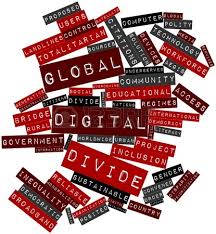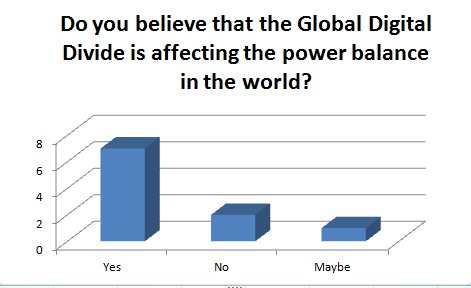
My Analysis
So what is the impact that computing, and its manifestation in the Global Digital Divide, is having on equity, access, and power? The digital divide is defined by equity, or more accurately inequity, of access to computing, so the question becomes what is the impact of that inequity? I list some impacts here:

- Education - Computing/technology has opened up a wide new world of education where vasts amounts of information is available via technology along with new effective teaching techniques such as video lectures, online collaborative environments, and self-paced technology driven labs. Students on the wrong side of the digital divide will start to see even a more pronounced weakness in their education as compared to students who have adequate access to computing/technology.
- Democracy - Some people believe that eliminating the digital divide would help countries becomes healthier democracies. They argue that communities would become much more involved and informed in events such as elections or decision making.[14] It has also been suggested that there is a correlation between democrat regimes and the growth of the Internet. One hypothesis by Gullen is, "The more democratic the polity, the greater the Internet use...Government can try to control the Internet by monopolizing control" and Norris et al. also contends, "If there is less government control of it, the Internet flourishes, and it is associated with greater democracy and civil liberties."[15]. I believe that a good democracy relies on an informed electorate - and computing/technology is the most effective information dissemination method avaiable - by far.
- Economic equality - The Internet is regarded by some as a basic component of civil life that developed countries ought to guarantee for their citizens. Additionally, welfare services, for example, are sometimes offered via the Internet.[14] From an economic perspective, Pick and Azari state that "in developing nations.foreign direct investment (FDI), primary education, educational investment, access to education, and government prioritization of ICT as all important".[15] Specific solutions proposed by the study include: "invest in stimulating, attracting, and growing creative technical and scientific workforce; increase the access to education and digital literacy; reduce the gender divide and empower women to participate in the ICT workforce; emphasize investing in intensive Research and Development for selected metropolitan areas and regions within nations".[15] I believe that those communities who lack computing/technology will not be able to compete economically.
- Economic growth - It is believed that less developed nations could gain quick access to economic growth if the information infrastructure were to be developed and well used. By improving the latest technologies, certain countries and industries are able to gain a competitive advantage.[14] Using previous studies (Gamos, 2003; Nsengiyuma & Stork, 2005; Harwit, 2004 as cited in James), James asserts that in developing countries, "internet use has taken place overwhelmingly among the upper-income, educated, and urban segments" largely due to the high literacy rates of this sector of the population.[16] As such, James suggests that part of the solution requires that developing countries first build up the literacy/language skills, computer literacy, and technical competence that low-income and rural populations need in order to make use of ICT.
To illustrate the societal impact, I polled 10 people and interviewd one. The following video shows the interviw. The results of my poll are shown in the first graph. The second graph shows a national survey taken by the IOG Connect organization.


